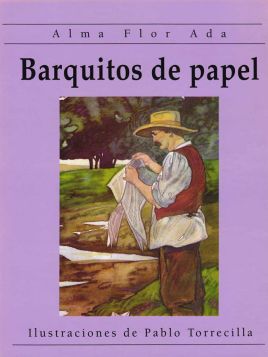Barquitos de papel
Barquitos de papel
BOOK DESCRIPTION
The simple experience of sailing folded paper boats after a rain storm is a window into the relationship between father and daughter
AUTHOR’S NOTE
I am frequently asked, by children and adults alike, which, among the many books I have written is my favorite. I try to explain that I cherish each of my books, because I have written each one with love and they all have taught me something about myself. But I must confess that my books of memoirs, Where the Flame Trees Bloom or Allá donde florecen los framboyanes and Under the Royal Palms or Bajo las palmas reales, as well as those in the series Cuentos con Alma, have a special significance because with them I have not only tried to capture the days of my childhood but I have honored the multiple people who made my childhood memorable. These books, as well as the memoirs I have written for adult readers, Vivir en dos idiomas have been my way of thanking those who enriched my spirit and taught me so much about trying to honor each day the gift of life.
Some of the greatest joys in my childhood came from very simple activities, as I have shared in the five books of memoirs in the series Cuentos con Alma: The making of paper boats, in Barquitos de papel, the nursery rhyme games, in Pin pin sarabín, flying kites in Barriletes, the annual visit of the humble circus, in Días de circo and the street vendor’s calls in Pregones, all held joy and life lessons.
My father, a surveyor and professor of mathematics, was also very gifted with his hands and he found ways to teach in surprising ways. There was much more to rainy days than making paper boats, although I have chosen them as the center of this vignette which speaks above all the love of a father for his young daughter.
Paper boats have remained to this day a wonderful symbol for me. I have mentioned them also in the poem La lluvia, in Do, re, mi, ¡sí, sí! book #8 in Colección Música amiga series. It has been a great joy for me that Suni Paz would create wonderful music for that poem, which she has recorded in the Do, re, mi, ¡sí, sí! CD. And the joy of paper folding is the motive for Origami in Con ton y son, book # 5 in Colección Música amiga.
READERS’ RESPONSES
If you have enjoyed reading or sharing this book, I would very much like to hear from you. Please click here to send your comments.

